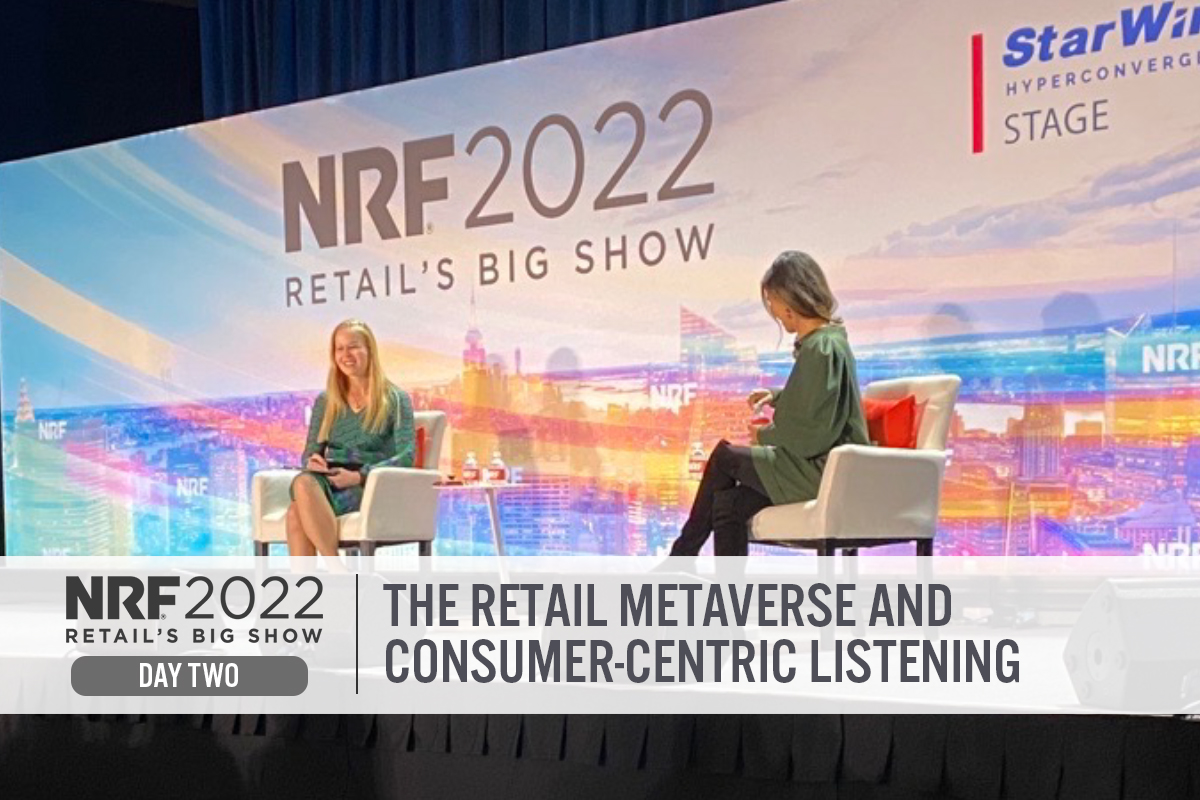
albert Chan
The Coresight Research team is attending NRF 2022: Retail’s Big Show in New York City, US, from January 16 to 18. The event, hosted by the National Retail Federation (NRF) brings together retail technology innovators, industry experts, brands and retailers to participate in panel discussions, present on key topics in retail and showcase their solutions.
In this report, we present our top insights from day two of the show on January 17, 2022.
NRF 2022 Day Two: Coresight Research Insights
Talent Is the Bottleneck for Metaverse Development
Deborah Weinswig, CEO and Founder of Coresight Research, joined Liz Bacelar, Executive Director of Global Tech Innovation at Estée Lauder, to discuss the rapid consumer adoption of the metaverse (a digital reality that can include elements from virtual and augmented reality) in the “Metaverse and NFT: Creative Catalysts for New Experiences in Beauty” session.
The Covid-19 pandemic forced the widespread adoption of new technologies and ushered in the convergence of physical and digital worlds for many US families over the last 22 months, with video-conferencing app Zoom becoming a household name. The metaverse is an extension and the natural progression of current digital enablement, with a fun, creative and imaginative aspect.
Bacelar said that Estée Lauder’s tech and digital strategy is considered within its framework of decision-making: Will it add value to the brand? At Clinique, NFTs (non-fungible tokens) and the metaverse are seen as relevant to the brand’s future. Clinique’s recent Meta Optimist campaign saw its Clinique Smart Rewards members compete based on the optimism they bring to those in their lives. As prizes, Clinique introduced its first three NFTs, which capture the spirit of its iconic products.
Bacelar emphasized the importance of the metaverse and NFTs to brands’ virtual identities. However, these virtual universes and products take time to create, and the work is often undertaken by third parties. Weinswig summarized the issue currently facing brands seeking to enter the metaverse and NFT space: “The talent is scarce.” [caption id="attachment_139651" align="aligncenter" width="550"]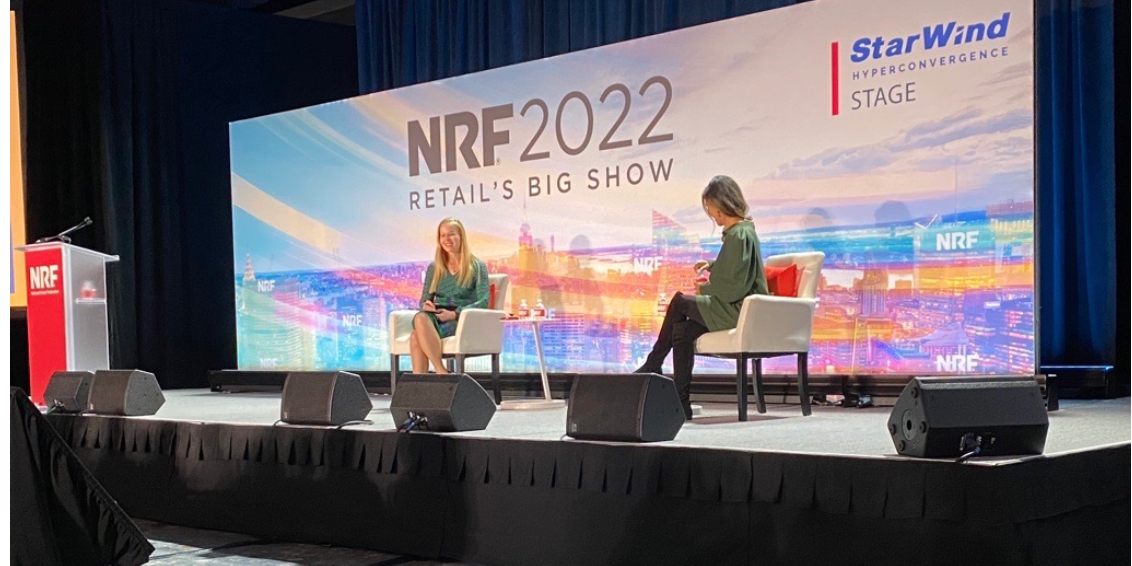 Weinswig, CEO and Founder of Coresight Research, and Liz Bacelar, Executive Director Global Tech Innovation at Estée Lauder, discuss the metaverse
Weinswig, CEO and Founder of Coresight Research, and Liz Bacelar, Executive Director Global Tech Innovation at Estée Lauder, discuss the metaverseSource: Coresight Research[/caption]
For Meaningful DEI, Integration Is Key
Day two of NRF coincided with Martin Luther King Jr. Day in the US and opened with a conversation focused on DEI (diversity, equity and inclusion) between Ken Chenault, Chairman and MD of General Catalyst (and Co-Founder of OneTen), and Maurice Jones, CEO of OneTen, titled “The Evolving Role of Business in Society.” Retail is an industry of impact, responsible for one in four jobs in the US workforce and known for giving back and supporting communities, the speakers emphasized. Retail has the power to lead and enact change for good to help fight financial instability, particularly for the underrepresented communities it serves. Chenault reminded the audience of Martin Luther King Jr. and his fight for social and economic justice, and asked for a rededication to realize Martin Luther King Jr.’s vision.
OneTen is a coalition of leading executives committed to upskilling, hiring and advancing 1 million Americans of color over the next 10 years into family-sustaining careers with opportunities for advancement. Some of the changes that can be made to facilitate this are obvious: Many jobs do not require university degrees at first, yet a four-year degree is a barrier for 66% of Americans and 76% of Americans of color, Chenault explained. Upskilling and reskilling is therefore central to OneTen, but it also requires a societal commitment, from coaching and mentoring to childcare and reliable transportation.
Jones concluded by reiterating OneTen’s ambitions: In a few years, it will have a goal of 5–6 million family-sustaining jobs.
Consumer-Centric Listening Is Being Redefined
John Furner, President and CEO of Walmart, took the helm of the NRF board as Chairman on January 16, 2022, succeeding Mike George, President and CEO of Qurate Retail, who held the role since 2020. On the second day of NRF 2022 during his first public appearance in the chairman role, Furner laid out his understanding of what listening to consumers should mean: Retailers should listen to consumers not to earn loyalty, but to better cater to their ever-shifting expectations; the industry should put customers at the center of everything it does.
“Retailers are the lifeblood of our communities, serving millions of customers every day with the items they need and much more,” Furner said. He noted that Martin Luther King Jr.’s vision still inspires his company, which is the largest private employer in the US, and his industry, which the largest private-sector employer. About 50% of Walmart’s workforce are people of color and 44% of its managerial positions are filled by women, Furner stated.
Regarding the current challenges facing the industry, Furner said that supply chain disruptions have led to inflationary pressures, and the industry should remain innovative to find solutions. Looking ahead, Furner believes that the time has come for retailers to implement sustainability at a greater scale, referring to the “Race to Zero Breakthroughs: Retail Campaign,” an initiative Walmart launched jointly with H&M and IKEA in January 2021.
[caption id="attachment_139652" align="aligncenter" width="550"]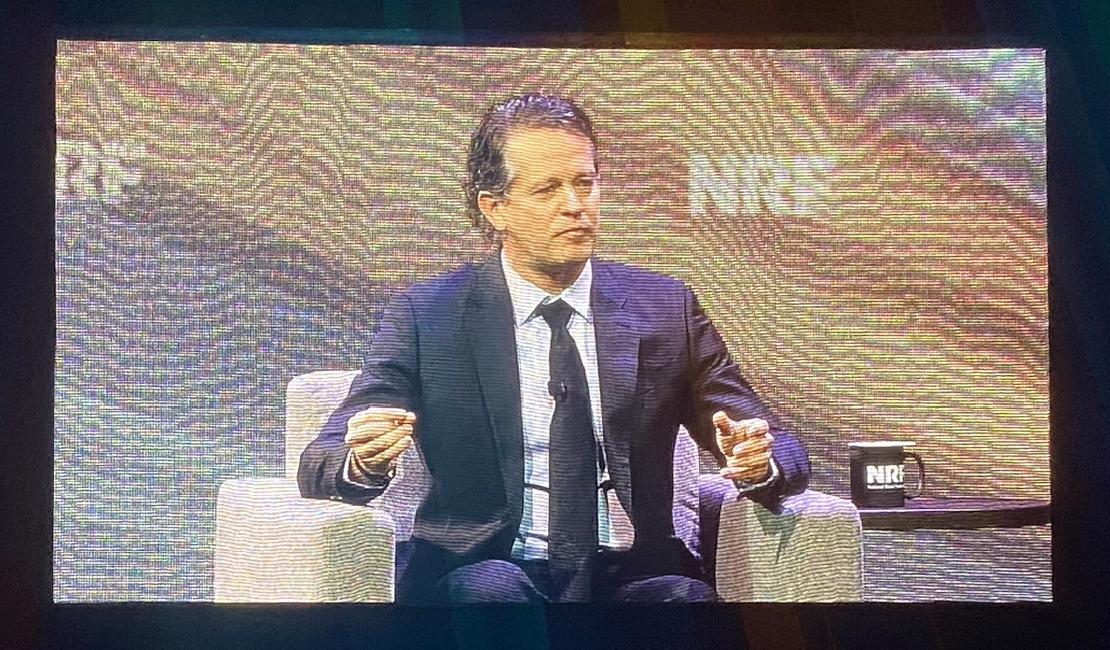 NRF Chairman John Furner
NRF Chairman John FurnerSource: Coresight Research[/caption]
Change from Within Through a Focus on Customers
In a session titled “Inside the Box Thinking Yields Innovation and Automation,” Vinod Bidarkoppa, CTO of Sam’s Club, argued that obsessiveness with customers can spur change from within to prompt a smooth shift from a store-centric to an omni-centric retail model. Bidarkoppa highlighted the importance of “inside-the-box thinking” as such a shift needs a fusion of old and new teams to properly address the complexity involved in legacy and new systems and to integrate new expertise into the system. A customer-obsessive culture will likely embrace change because customers are more open-minded to change. Returns on investment in the omnichannel shift is measured mainly in how much membership grows, Bidarkoppa noted.
[caption id="attachment_139653" align="aligncenter" width="550"]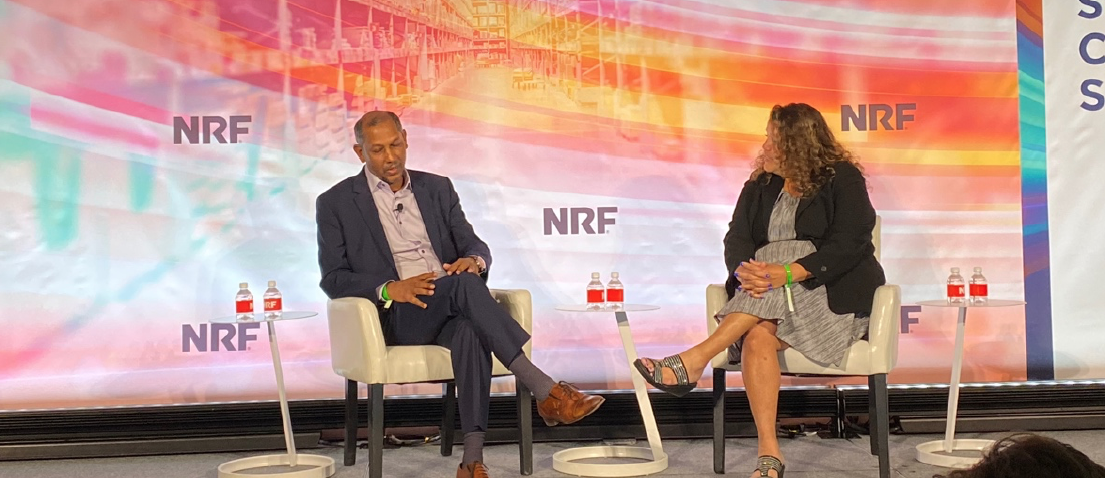 Vinod Bidarkoppa, CTO at Sam’s Club (left), talks about consumer obsessiveness
Vinod Bidarkoppa, CTO at Sam’s Club (left), talks about consumer obsessivenessSource: Coresight Research[/caption]
Innovation Is Key at Ralph Lauren
At NRF 2022, Patrice Louvet, President and CEO of Ralph Lauren, discussed the imperative of innovation in product and go-to-market strategies to engage new shoppers. The heritage of the 50-year-old brand is not enough, he emphasized. The pandemic provided an opportunity to reset the brand to the vision, purpose and values of Ralph Lauren, which Louvet describes as a mission “to inspire the dream of a better life through authenticity and timeless design.”
In addition to new product categories (footwear, outerwear and home) and opening new stores around the world, new ways of shopping are a priority, with brand elevation at the core. The aspirational worlds of Ralph Lauren, from sailboats to western ranches to Manhattan townhouses, find their parallel in the opportunity of the metaverse: Both share the currency of dreams, storytelling and immersive experiences, Louvet explained. While we are still in the very early days of the metaverse, and its strategic, business and profit opportunities are unclear, there is growing consumer interest and it is a new revenue source.
[caption id="attachment_139654" align="aligncenter" width="550"]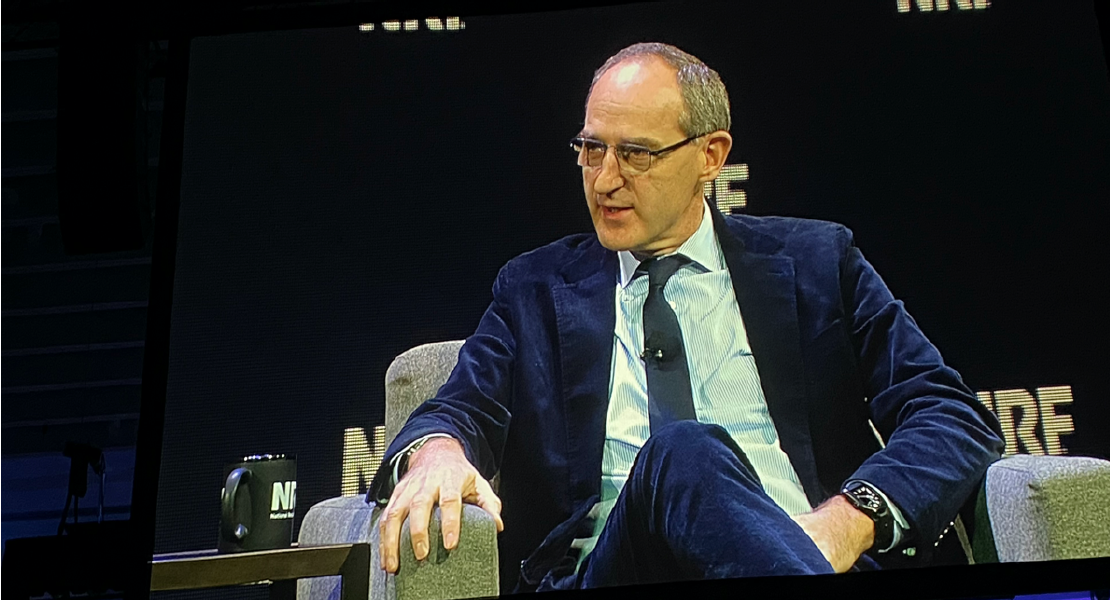 Patrice Louvet, President and CEO of Ralph Lauren
Patrice Louvet, President and CEO of Ralph LaurenSource: Coresight Research[/caption]
Physical Stores Are Still Important for Brands
Louvet said that Ralph Lauren believes in the role of physical stores. Last year, Ralph Lauren opened 80 stores, including some that included hospitality and immersive services. For example, the brand’s Beijing store, which opened in August, includes a coffee bar and virtual try-on technology. Louvet added that, over the past few years, there has been an industry-wide question of whether consumers will migrate to online and the role of stores will diminish. He said that in the absence of pandemic restrictions, when consumers were able to return to stores, traffic went up considerably, affirming that the consumer wants to shop everywhere the brand is.
When asked about Ralph Lauren’s place in department stores, Louvet said that Ralph Lauren believes in the department store and the wholesale channel. He added that consistency is a priority for the brand: “Wherever we show up, we want to make sure we are consistent with the image that we have,” he said.
Instant Delivery Models Can Support Sustainability
Ben Jones, Founder and CEO of Ohi, a delivery platform for direct-to-consumer brands, has helped shape the new “instant” trend, offering customers 20-minute or two-hour delivery options. That speed is ensured by a micro-fulfillment platform that uses location data and consumer patterns in delivery-dense urban areas. One might assume, Jones said, that this instant-delivery model would come at the expense of sustainability—but this was not the case, and sustainability is the firm’s core value. Ohi will expand into 25 markets from its current six by year-end, Jones added.
[caption id="attachment_139657" align="aligncenter" width="550"] Ohi delivery tote bag and app
Ohi delivery tote bag and appSource: Company website[/caption]
Technology and Passion Drive Sustainability
The goal of sustainability and circularity is to create an ecosystem of buy-and-sell and use-and-reuse, as highlighted in the “Sustainability and Circularity at the Forefront of ESG” session, which also put significant emphasis on consumer engagement. Consumers increasingly want to know how products are made and whether the supply chains are run sustainably and fairly, said Elyse Tosi, Senior Director of Accounts and Client Success at Eon. Consumers’ responses to sustainability are often tense and emotional, noted Michael Newman, CEO of Returnity, a reusable shipping and delivery solution provider. This emotional response stems from the fact that customers have already assumed their favorite brands align with their values, said Karin Dilie, Vice President of resale service Recurate. Tosi stressed that data are central to digital traceability that enables both consumers and stakeholders to identify sustainability values.
- Explore our wider coverage of sustainability—a key theme for retail in 2022.
For Gen Z, Brands Need To Tell Stories, Not Advertise
Meagan Loyst, Associate at Lerer Hippeau, argued that the most effective brands among Gen Z tell stories. For example, education and tutoring brands show how consumers can ace exams instead of selling their products to consumers or language companies.
Loyst also emphasized that brands should empower creators with as many tools as possible, because on Gen Z platforms such as TikTok, creators are telling a brand’s story. The brand cannot control that story, but they can take advantage of the content that is generated. For example, TikTok creator Emily Zugay spoofed and recreated “bad national brand logos” including Starbucks, Apple, McDonalds and Microsoft. Other national brands then began contacting Zugay to redesign their logo because she was gaining so much attention on social media.
Artificial Intelligence Can Be Retailers’ Point of Difference
At the session “AI Demand Planning: A Game Changer Redefining Traditional Practices,” speakers discussed how they are leveraging artificial intelligence (AI) technology in their organizations.
Andy Kettlewell, VP of Inventory Management at Walgreens, described how the company used AI to predict regional variation in seasonal illness. Walgreens’ AI technology performed a geographic analysis down to the zip code, allowing company to understand local patterns, such as when school comes in and out of season, and holidays. Walgreens now tracks both category demand, such as trending products, local store traffic demand, based on local events such as concerts or parades.
Daragh Sibley, Director Data Science at Stitch Fix, said that AI is its strategic differentiator, because it offers customers selections based on AI that the company has developed using advanced algorithms.